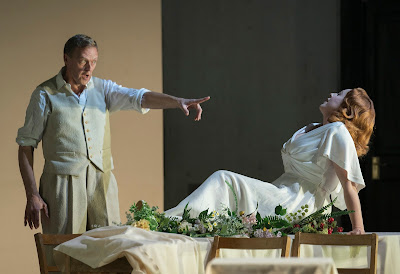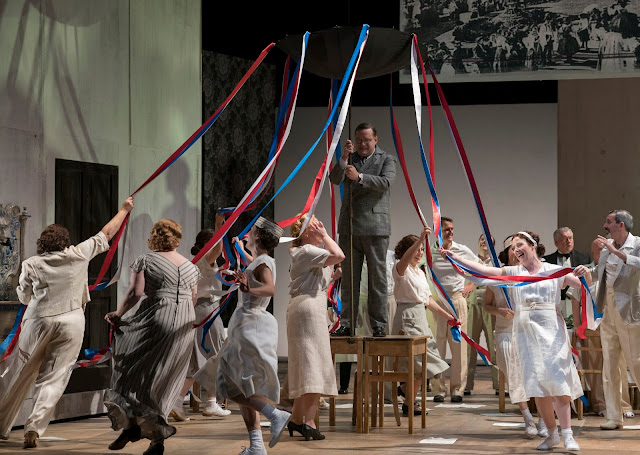 |
| Opera North’s production of Ravel’s L'enfant et les sortilèges, Autumn 2017 John Graham-Hall as Tea Pot, Ann Taylor as Chinese Cup, Wallis Giunta as the Child (Photo Tristram Kenton) |
Reviewed by Robert Hugill on Oct 20 2017 Star rating:
The first of three double bills, Janacek's rarely performed and musically thrilling opera alongside an imaginative rendering of Ravel's masterpiece
With The Little Greats season Opera North is revisiting the imaginative idea of presenting a programme of one-act operas which they first did with Eight Little Greats in 2004. This time six operas were presented in Leeds in flexible programmes, which tour in fixed double bills, with operas by Janacek, Ravel, Bernstein, Gilbert & Sullivan, Leoncavallo and Mascagni.
For the weekend of 20-21 October 2017, we took the opportunity to catch all six operas performed over two days at the Grand Theatre, Leeds. On Friday 20 October we caught Janacek's Osud and Ravel's L'enfant et les sortileges, both directed by Annabel Arden and conducted by Martin Andre, sets by Charles Edwards and costumes by Hannah Clark.
Janacek's Osud featured John Graham Hall as Zivny, Giselle Allen as Mila, Rosalind Plowright as Mila's mother, Peter Auty as Dr Suda, Richard Burkhard as Konecny, Ann Taylor as Miss Stuhla, Bryn Mashburn or Rafi Sherman as Doubek as a boy, and Warren Gillespie as Doubek as an adult.
 |
| Janáček’s Osud, John Graham-Hall as Živný, Giselle Allen as Míla (Photo Alastair Muir) |
Janacek's Osud comes between the premiere of Jenufa in Brno in 1904 and the opera's first Prague performance in 1916, so Osud is hardly an early work but it is highly experimental and strangely uneven. Based on a real life incident it is about a composer, Zivny (John Graham-Hall) who is writing an opera about an incident in his own life, and Osud is as much about Zivny, his opera, and the idea of opera, as about relationships between the characters. In fact, Osud's leading lady, Mila (Giselle Allen) dies at the end of Act Two, leaving the final act to Zivny and his opera. The style is very much the collage technique that Janacek would used in operas like From the house of the dead. The result is very filmic and though Osud runs headlong it never quite coalesces.
Annabel Arden's production was somewhat abstract, understandably so as Janacek crams so much incident into the opening act in the spa town. She concentrated on details, providing a collage of short scenes inter-cutting each other and flowing nicely. The opera has a large cast, over 24 named roles. Osud and L'enfant et les sortileges had a lot of smaller roles which enabled Opera North to showcase soloists from the chorus. The result was an engaging directness which swept you along, for all the dramaturgical faults.
 |
| Ravel’s L'enfant et les sortilèges, Katie Bray as Louis XV Chair, John Savournin as the Armchair and Wallis Giunta as the Child (Photo Tristram Kenton) |
The role of Zivny's on-off-on lover Mila is a bit strange, the cynosure of all eyes in Act One, after marriage to Zivny she seemed to diminish, becoming more down at heel in Act two, not coping with life with a mad mother and and itinerant musician. Giselle Allen made it work, charming in the first act and matching Graham-Hall's intensity in Act Two.
Mila's mother is a small but important role. Rosalind Plowright made her rigid and elegant in Act one, so the collapse when she learned of Zivny and Mila's marriage, was believable. And the madness in Act Two was striking. Peter Auty, Richard Burkhard and Dean Robinson formed the trio of men floating round Mila in Act One, popping up repeatedly, always charmingly characterful, with Ann Taylor in the small but important role of the schoolmistress.
Warren Gillespie had the short but important role of the adult Doubek (Mila and Zivny's son) in Act Three, but Bryn Mashburn or Rafi Sherman was really impressive in the role of the child Doubek, singing with complete aplomb.
Osud is a problem work, but the music is stunning and Martin Andre and the Orchestra of Opera North gave it real heart.
Ravel's L'enfant et les sortileges is a problem in a different way. A great opera, yet a challenge how to incorporate the singers into the action. Annabel Arden took a psychological approach. We first saw the child (Wallis Giunta) with his family, misbehaving and the family then metamorphosed into the furniture, the fire etc. There is a theory that the opera is about the child's development so we had sexual references, the clock's (Quirijn de Lang) broken pendulum, the teapot's (John Graham-Hall) phallic spout and the Chinese cup's (Ann Taylor) breast-like use of her cups; romantic love with the princess (Fllur Wyn); and a Christ-like wounding of the tree (John Savournin). Finally, at the end the squirrel (Ann Taylor), which the child heals, turned back into mother.
All this could have been a bit heavy, but Annabel Arden and her cast made it real fun. Each short scene had great character, you felt the cast's enjoyment. The psychological element became simply part of a whole.
 |
| Opera North’s production of Janáček’s Osud, Autumn 2017 Peter Auty as Dr. Suda and members of the Chorus of Opera North (Photo Alastair Muir) |
Again, members of the chorus provided smaller roles and contributed to the whole. I loved the way the chorus was faceless in the garden scene, dramatically coherent and rather scary. Martin Andre and the orchestra contributed the colours and sophistication of the score to make up the whole.
This production of L'enfant et les sortileges deserves to come back, perhaps Annabel Arden could be invited to direct Ravel's L'heure Espagnole as a companion.
Opera North The Little Greats season, my reviews:
Leoncavallo & Mascagni, Bernstein, Gilbert & Sullivan, Janacek & Ravel
Elsewhere on this blog:
- Not just a vanity project; Director Sophie Gilpin talks about HeadFirst Productions' Festival of Love, Sex and Death - interview
- Rising stars: Christophe Rousset directs Handel's Semele with OAE - opera review
- Lieder von Orient: Benjamin Appl & Graham Johnson at the Oxford Lieder Festival - concert review
- Fascinating links, fine performances: Brahms late idyll explored in day of recital and lectures at Oxford Lieder Festival - concert review
- Scarcely a problem: Tchaikovsky's Manfred Symphony from Semyon Bychkov & Czech Philharmonic - CD review
- Kill or cure: Pianist Julian Jacobson on his 70th birthday series - interview
- Visually flamobyant path to enlightenment: Mozart's The Magic Flute from the Metropolitan Opera - Opera review
- Engaging & colourful: Handel's Neun Deutsche Arien - CD review
- Jonas Kaufmann: Tenor for the Ages John Bridcut's new TV profile of the star tenor - tv programme review
- Historical context & fun: Lucy Worsley's Nights at the Opera - tv programme review
- Violin muse: I chat to violinist Madeleine Mitchell - interview
- Terrific show: Covent Garden's revival of Verdi's Les vepres siciliennes - opera review
- Home











No comments:
Post a Comment